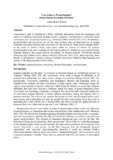| dc.creator | Barron, Joshua Robert | |
| dc.date.accessioned | 2024-01-31T16:44:59Z | |
| dc.date.available | 2024-01-31T16:44:59Z | |
| dc.date.issued | 2021-04 | |
| dc.identifier.citation | Global Missiology 18, no. 2 (April 2021) | en_US |
| dc.identifier.uri | http://hdl.handle.net/11558/7839 | |
| dc.identifier.uri | http://ojs.globalmissiology.org/index.php/english/article/view/2428/5795 | |
| dc.description.abstract | Conversion is part of Christianity’s DNA. Scholarly discussions about the meaning(s) and
nature of Christian conversion perhaps reflect a popular—and historical—confusion about
conversion vis-à-vis proselytization (e.g., Goodman 1994; Cornelli 2017, 413). Nonetheless,
proselytization and conversion are not the same. Culture plays an important role in proper
Christian conversion because this conversion, or “the turning to Christ what is already there”
in the words of Andrew Walls, takes place within the context of culture. By contrast
proselytization is the mere exchange of one human culture for another and was rejected by the
Apostles. Because “the gospel enriches the culture,” in African contexts “Christianity should
strengthen and reaffirm one’s African identity” (Falconer 2015, 161). After exploring these
themes, I will propose a model to discuss Christian conversion within the Maa language and
culture of the Maasai people of East Africa. | en_US |
| dc.language.iso | en_US | en_US |
| dc.publisher | Global Missiology | en_US |
| dc.subject | Christianity, conversion to | en_US |
| dc.title | Conversion or Proselytization? Being Maasai, Becoming Christian | en_US |
| dc.type | Article | en_US |


